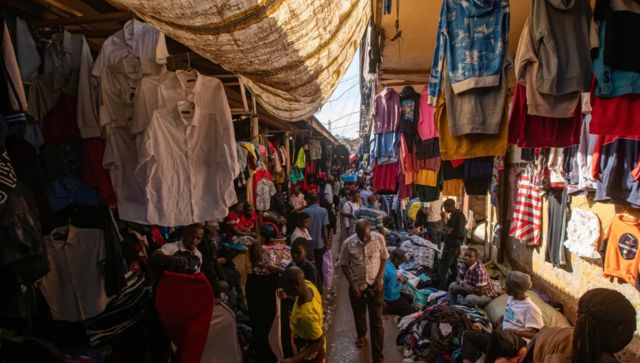Uganda’s capital has seen the bustling Owino secondhand market as the foundation of Hadija Nakimuli’s life for close to thirty years. As a widowed shopkeeper, it has been instrumental in her journey to building a home and raising twelve children. However, a potential ban on used clothes imports, recently emphasised by President Yoweri Museveni threatened Nakimuli and thousands of vendors. Museveni aims to “promote African clothing,” raising concerns for the future of businesses like Nakimuli’s. The sprawling market established in 1971 employs around 80,000 people, with 70 per cent being women, according to Kampala city authorities. Joseph Barimugaya, a menswear stall owner, emphasises the trade’s benefits for everyone, including the government through taxes.
Despite the lack of official figures, the Uganda Dealers in Used Clothings and Shoes Association estimates that one in three Ugandans, approximately 16 million people, wear used clothing. ‘Everyone is into secondhand clothes. Only a few people in Uganda can afford new clothes,’ Allan Zavuga, retail manager of Think Twice, which employs 30 staff across three branches in the country told AFP. ‘Banning it in Uganda is doing a disservice to the population and also the country at large,’ he said. ‘Clothes from dead people’ “Everyone is into secondhand clothes. Only few people in Uganda can afford new clothes,” said Allan Zavuga, retail manager of Think Twice, which employs 30 staff across three branches in the country. “Banning it in Uganda is doing a disservice to the population and also the country at large,” he said, pointing out the environmental cost of producing new clothing instead of reusing items. East Africa imports about an eighth of the world’s used clothing, providing jobs for some 355,000 people who earn $230 million a year, according to a 2017 study by the US government’s aid agency, USAID. But the sector has also been a longstanding sore point for governments in Africa, who say the cast-offs harm the domestic textile industry. “These clothes are from the dead in a foreign country. When a white (person) dies, the clothes are sent to Africa,” President Yoweri Museveni said in August this year. “I have declared war on secondhand clothes to promote African wear,” he said. In an interview with AFP, Uganda’s state minister for trade, David Bahati, said it was a question of “dignity”. If the proposed ban goes ahead, “we will be able to replace these second hand clothes”, he added. “It cannot be done in one day but we can do it in a gradual manner,” Bahati said. The government is examining the issue with a view to potentially implementing the ban in January. “The government is ready to give investors incentives… such as tax holidays to ensure we process our cotton into new garments to cover the market demands.” In 2016, Museveni sought to ban used clothing as part of an East African initiative to develop domestic industries, but faced significant opposition by the Kampala City Traders Association. Diplomatic considerations also played a part. Initially, the East African Community regional bloc put up a united front. But the alliance cracked after Kenya, Tanzania and Uganda balked at the prospect of retaliatory loss of duty-free access to US markets. In the end, Rwanda decided to go it alone and imposed steep taxes on used clothing in 2016, leading to a sharp drop in imports and an increase in the smuggling of secondhand goods to meet demand. Two years later, the US suspended duty-free benefits for apparel from Rwanda in a tit-for-tat move. At Owino, geopolitics is far from the minds of shoppers and sellers alike. “Who did the government consult (before deciding) to ban secondhand?” second-generation shopkeeper Harriet Musoke Kyambadde asked, her voice trembling with indignation. “Banning this business will be sending me into abject poverty,” the mother of three told AFP, throwing her hands in the air. With inputs from AFP.
)